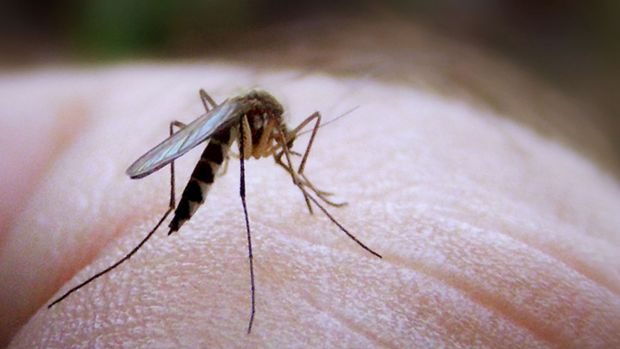
Do mosquitoes love you, but leave your partner alone? This could be why.
Want to avoid mosquito bites? Then don’t count on diet to give you a helping hand – advice like eating garlic, taking vitamin B supplements, eating a vegetarian diet or drinking apple cider vinegar is more folklore than fact, according to medical entymologist Dr Cameron Webb from the University of Sydney.
That said, science has learned something about what can make some of us more likely to be bitten than others – pregnancy, drinking beer and having type O blood can make you a little more enticing, Webb says, although a more potent lure is sweat laced with lactic acid – the substance produced when we’re exercising, he explains in a recent article in The Conversation.
Mozzies are drawn to humans by certain scents produced by bacteria living on our skin – and these vary from person to person. But while researchers are making progress with identifying which scents attract mosquitoes – and which ones repel them – it’s complicated by the fact that different types of mosquitoes like different scents, he says.
Malaria-carrying mosquitoes are keen on smelly feet, for instance (an argument for wearing more than just Havaianas in malaria-prone holiday spots) while the mozzie that brings dengue fever likes the whiff of a workout – lactic acid.
Fascinating as this is, the information that should really focus our minds is how to protect ourselves from the growing threat of mosquito-borne illnesses, stresses Webb.
“While Australia is free of serious mosquito-borne disease such as malaria, we have dengue fever and Ross River and Barmah Forest viruses which can be spread by local mosquitoes and cause debilitating disease. Ross River virus in particular has now been found in every State in the country and is becoming more common on urban fringes – not just in the bush,” he says.
Although the numbers of Australians returning from overseas with malaria has dropped over the last two decades, cases of dengue fever are rising – already this year Australia has chalked up 162 cases of dengue, while last year there were more than 1500 cases, some picked up at home (outbreaks of dengue only occur in Far North Queensland), others from tropical areas overseas including South East Asia and the Pacific.
The mosquito that brings dengue thrives in towns and cities, not just rural areas – and also carries chikungunya (chik-un-gun-ya) an infection once most common in Africa but now increasing in Asia, the Pacific Islands and even Europe. Although rarer than dengue and not fatal, it has symptoms like joint pain that can last for months or years.
What many Australian travellers don’t realise about both dengue and chikungunya is that the mosquitoes that carry them bite during the daytime.
“You’re just as much at risk of picking up dengue at breakfast in Bali as you are at dusk,” Webb points out.
“And just because your skin doesn’t itch or turn red doesn’t mean you’ve escaped a bite – we’re all different in how we react to the saliva from any mosquito and it’s possible to be bitten without feeling a thing.”
You might find many “natural” insect repellents in pharmacies and health food stores, but the evidence is that the most effective insect repellents are synthetic: products containing DEET (N, N-diethyl-m-toluamide) and picaridin. The runner up is a botanical pesticide called PMD made from lemon eucalyptus leaves.
“Although it’s not as effective as DEET or picaridin, it outperforms all other botanical products,” says Webb.
“There are some misconceptions about the safety of DEET, but it’s been used for 70 years with few adverse effects and reviews of studies into DEET say that it’s safe. Where there have been adverse events it’s usually because it’s been misused.”
If you’re buying insect repellent containing DEET, it’s important to understand how long the product is effective for once it’s applied, he adds – a product with five per cent DEET will last for around one hour, while a product with 80 per cent DEET may last for more than eight hours.
